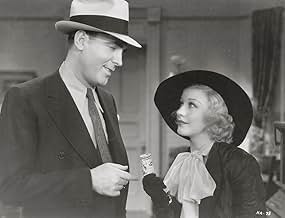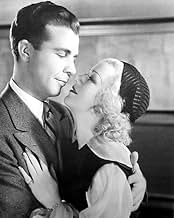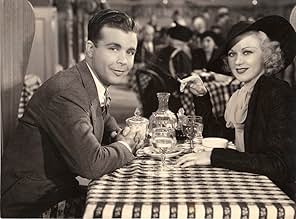Füge eine Handlung in deiner Sprache hinzuUnscrupulous agent Rush makes singing waiter Clayton a big radio star while Peggy, who has lost her own radio show, helps Clayton.Unscrupulous agent Rush makes singing waiter Clayton a big radio star while Peggy, who has lost her own radio show, helps Clayton.Unscrupulous agent Rush makes singing waiter Clayton a big radio star while Peggy, who has lost her own radio show, helps Clayton.
- Auszeichnungen
- 1 wins total
- The Mills Brothers
- (as The Four Mills Bros.)
- Ted Rio Rita and His Orchestra
- (as Ted Fio Rito and His Band)
- Herbert Brokman
- (as Joseph Cawthorne)
- Three Mimics
- (as The Three Radio Rogues)
- One of the Three Radio Rogues
- (as Jim Hollingwood)
Empfohlene Bewertungen
Pat O'Brien has one of his wheeler-dealer roles as Russell Blake, an agent who's not delivering the great talent he's promised his boss but keeps getting pay advances nonetheless. Finally he's fired. However, at a restaurant, he hears a singing waiter, Buddy Clayton (Dick Powell) do a goofy "The Man on the Flying Trapeze" and brings him to the attention of the radio station. Reluctantly, his boss (Joseph Cawthorne) gives Buddy an audition - and is immediately sorry. Admittedly it's hard to hear Buddy's real voice singing the Flying Trapeze song.
Eventually, however, everyone hears Buddy sing and a radio show sponsor wants him. The current singer, Peggy Cornell (Ginger Rogers) clicks with Buddy, which makes for complications.
The score by Dubin and Warren is very good, as well as other songs, and there are performances by the Mills Brothers, bandleader Ted Fio Rito, Ginger Rogers, and The Radio Rogues.
The versatile Dick Powell had a beautiful tenor voice, showcased here, and Rogers is delightful. They made a cute couple. Besides his in front of the camera talent, Powell was a very astute businessman and had a keen eye for talent himself. During his career, he acted, produced, directed, and was responsible for giving Aaron Spelling and Sam Peckinpah their starts. Rogers of course would go on to do her films with Astaire.
Fun film, some good music, loved the cast.
Modern audiences won't be very taken by what passes as the comedy in "Twenty Million Sweethearts." Most fans from the mid-20th century on didn't care much either for the fast-talking, bombastic personas such as Pat O'Brien sometimes played, as he does here. That was something that apparently enjoyed a short stint of popularity in early sound pictures, but quickly died out within a few years. O'Brien's Rush Blake is as much a cad as he is a good guy, and while his boisterous character is just tolerable, his last tirade toward the end of the film is way overboard. It's not only unnecessary, but it would have improved the film to have left that on the cutting room floor. The only real comedy is in the short scenes with Allen Jenkins who plays Pete, host of a children's afternoon radio show.
But for most of this movie, audiences are in for a treat, seeing the singing that was popular at that time. Dick Powell had a very good tenor voice, and he plays a very likeable Buddy Clayton. And opposite him is a very young Ginger Rogers as Peggy Cornell, who shows that she could sing a nice tune. And, another special reason for seeing and enjoying this film is the Mills Brothers. This was just the second of a dozen films the famous singing foursome would be in. This is in their early years with some of the humorous tunes they sang then. By the 1940s, they would skyrocket on the music charts with many hit tunes over three decades. Performing until the early 1970s, the Mills Brothers would record more than 2,000 songs that sold more than 50 million records.
No other artists or groups could sing their top hits tunes as well, and no others even tried to record some of their best tunes. The lasting talent and quality of the Mills Brothers is proven as some of their top tunes are still heard on radio music programs and in occasional modern films. Once one heard these songs, they'd be remembered forever as sung by the Mills Brothers - "Paper Doll" of 1943, "St. Louis Blues" of 1944, "You Always Hurt the One You Love" of 1944, "Glow-Worm" of 1952, "Memory Lane" of 1956, "Say Si Si" of 1964, "Dream a Little Dream of Me" of 1968, and "Dream" of 1969.
This is a movie to enjoy the old-fashioned type of stage shows, the heyday of radio entertainment, and a look at top and upcoming musical talents of the time.
The best humorous line in the fine was by Pete, when actor Jenkins says, "I hate kids. I think every child should be born at the age of 20. Maybe they'd have some sense."
The first half is very enjoyable with a behind-the-scenes look at radio, the Mills Brothers, O'Brien's matchless chutzpah, and Powell's knockout rendition of "I'll String Along with You". Apparently, however, the screenwriters had another 30 minutes to fill, so they recycled much of the first half. The trouble is that unlike love and the old song, the plot etc. is not better "the second time around". What's really unfortunate is that the fine signature tune is repeated to the point of tedium. Too bad the film didn't quit while ahead.
Of course, watching Rogers at this career stage remains a treat even if she's more subdued than usual. While O'Brien machine guns out more words per second than a dragster spits out rpm's. His promotional drive almost amounts to a force of nature. At the same time, Powell does his tuneful tenor bit as a "Lochinvar from California" heart-throb". However, some of his facial expressions while crooning the musical's last number are borderline clownish.
All in all, the impression is of a pleasant lower-end musical whose repetitive material over- stretches a solid core of performers and a great signature tune.
Wusstest du schon
- WissenswertesScreenwriter Julius J. Epstein first arrived in Hollywood about 10:30 p.m. on October 14, 1933 and by midnight was collaborating on the screenplay of Twenty Million Sweethearts (1934) as pages had to be turned in early Monday morning.
- PatzerAt about the one-hour mark Buddy Clayton (Dick Powell) is in a hotel room chatting with Pete (Allen Jenkins). As Powell reaches, his vest buttons itself.
- Zitate
Pete: Well, I've put all the kiddies east of the Mississippi to bed. How's rehearsal?
Peggy Cornell: Oh awful. Some yokel stood outside the rehearsal hall making and stared at me until I nearly broke me up. What have you got a summons?
Pete: No, fan mail.
Peggy Cornell: Oh. Three of them. That's two more than last week! Your public are growing up and learning to write.
Pete: Listen to this: Dear Uncle Pete. I am well. How are you? I hear you on the radio every night. Great stuff for a he man poet... Have you heard my last poem, Peggy?
Peggy Cornell: I sure hope so.
Pete: Frankie Wallace was a pug. He laid his opponents out like a rug. Until one day... Wait a minute! You haven't heard the last of it.
Peggy Cornell: Well. You've got me cornered.
Pete: Frankie Wallace was a pug. He laid his opponents out like a rug...
- VerbindungenFeatured in Die Kunst zu lieben (1971)
- SoundtracksThe Last Round-Up
(1933) (uncredited)
Written by Billy Hill
Sung with modified lyrics by Eddie Foster, Billy Snyder, Matt Brooks and Morris Goldman
Top-Auswahl
Details
- Erscheinungsdatum
- Herkunftsland
- Sprache
- Auch bekannt als
- Hot Air
- Drehorte
- Produktionsfirma
- Weitere beteiligte Unternehmen bei IMDbPro anzeigen
- Laufzeit
- 1 Std. 29 Min.(89 min)
- Farbe
- Sound-Mix
- Seitenverhältnis
- 1.37 : 1
































